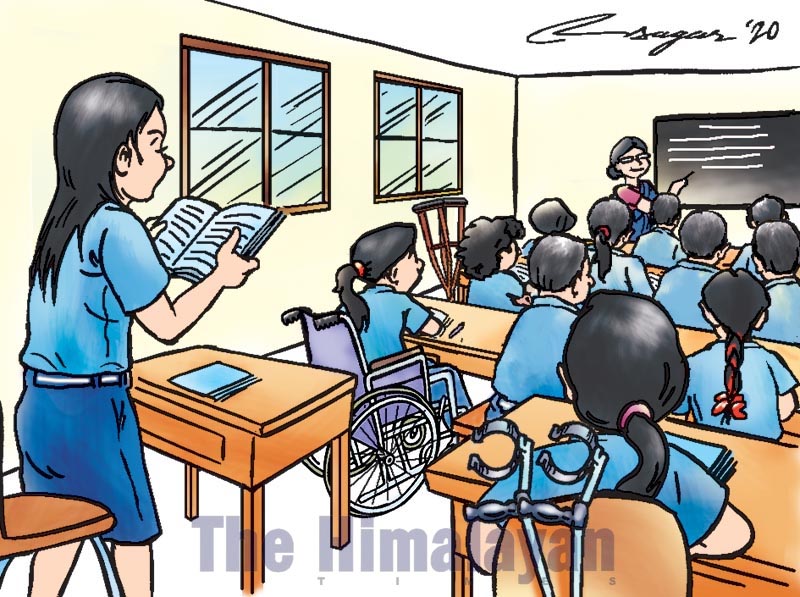Inclusive education: It benefits everyone
Every child has the right to be supported by the community to grow, learn and develop in the early years, and, upon reaching school age, to attend school, and be welcomed by teachers and peers alike
Inclusive education means an effective learning environment for all students, including children with disabilities. Exclusion does not only refer to differently able children, for whom access to education is if often denied, but also for those who are discriminated on the ground of social condition, ethnic origin, cultural background, gender and sexual orientation. According to UNESCO, inclusive education is seen as “a process of addressing and responding to the diversity of needs of all learners through increasing participation in learning, cultures and communities, and reducing exclusion from education and from within education”. The United Nations Children’s fund (UNICEF) strives for all children to have equitable access to education as a basic human right.
Children with disabilities are less likely than their peers to receive an education: roughly 90 per cent of children with disabilities in developing countries do not attend school.
Reaching out to the excluded and marginalised groups and providing them with quality education require the development and implementation of inclusive policies. If educational policies and programmes, the government, NGOs and INGOs effectively advocate for the basic human right
of education for all, all children around the globe will efficiently learn the skills that are relevant to be successful both at work and in life.
The goal of inclusive education should focus on the whole education system that will facilitate a learning environment where teachers and learners embrace and welcome the challenges and benefits of diversity.
Inclusive education is not only about attaining universal access to education, but also universal access to meaningful and purposeful knowledge and learning for all. It should provide such an educational setting where students from different backgrounds and with different abilities learn together in an inclusive environment, and where they are encouraged to learn, participate and contribute to all learning activities.
Inclusive education has benefits and challenges, too. It has benefits not only for children with special needs and families, but for all children.
When children are treated equally and motivated to participate in the school programmes, they learn to accept, love and care for others. In addition to
this, children with disabilities develop a positive self-image and different skills like friendship skills, peer models, problem-solving skills, communication skills and showing respect for others.
Both students with and without disabilities learn more. Many studies over the past decades have found that students with disabilities have higher achievement and improved skills when there is inclusive education. Students with disabilities are also associated with fewer absences and referrals for disruptive behaviour.
These are related to the findings about attitude - they have a higher self-concept, they like school and their teachers more, and are more motivated to work and learn. Research shows the presence of students with disabilities (SWD) gives non-SWDs new kinds of learning opportunities. By learning how to help another student, their own performance improves.
And teachers take into greater consideration their diverse SWD learners by providing instruction in a wider range of learning modalities - visual, auditory and kinaesthetic - which benefit their regular students as well. These can also improve the self-esteem of the families of students with disabilities when their children are accepted equally in every possible way.
On the other hand, inclusion does have many challenges, too. School teachers do not have the right strategy or ideas to help individual children.
Families can be resistant to the idea of inclusive education, thinking that a child with disabilities will take up too much of the teacher’s time and their children will remain unattended. However, with effective communication among the teachers and families, this problem can be overcome.
In order to advance inclusive education, the educators should be well trained and should have resources to teach students with diverse needs and learning styles. Parents should be empowered in terms of entertaining their child’s right to education in an inclusive setting. Moreover, the entire community, including parents, teachers, special educators and social workers, should compulsorily participate in the design and delivery of inclusive education, and they must take it as a shared responsibility.
Furthermore, the government, NGOs and INGOs, accountable for implementing anti-discrimination legislation for inclusion and policies, should remove the barriers that exist in promoting such an education.
And the government must be prepared to invest in substantial resources like teacher and staff training, learning materials and equipment since students with special needs require additional financial resources for their education with different skills.
Every child has the right to be supported by their parents and community to grow, learn and develop in the early years, and, upon reaching school age, to attend school, and be welcomed and included by teachers and peers alike. When all children, regardless of their differences, are educated together, it results in many benefits.
Priya is an English language teacher






